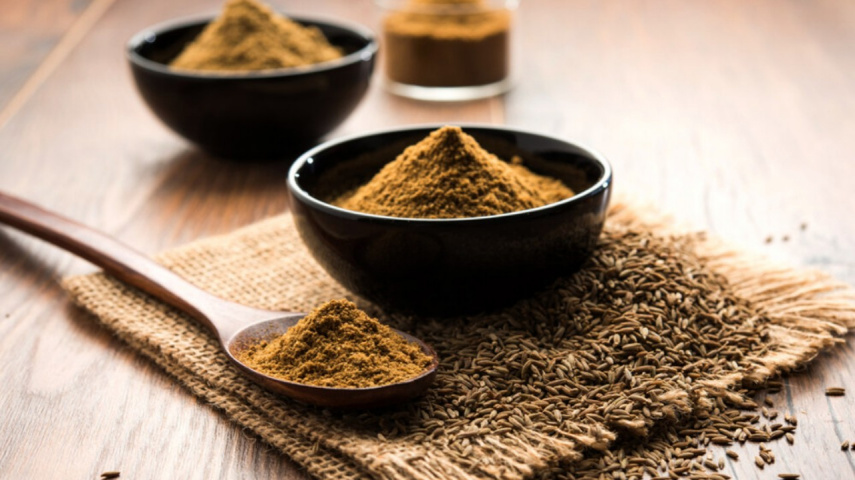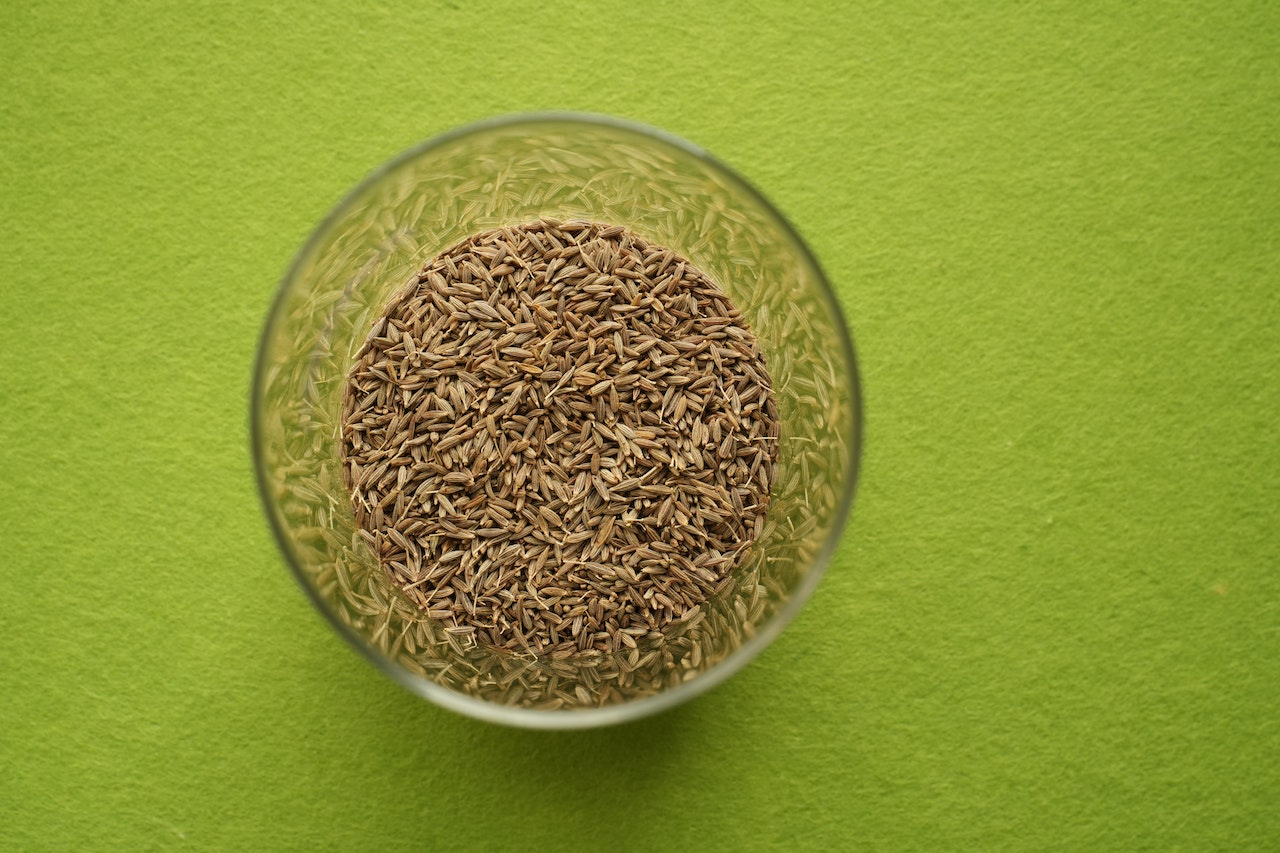Health Benefits of Cumin: A Spice Worth Adding to Your Diet
Unleash the amazing benefits of cumin spice for your health and wellness. From boosting digestion to strengthening immunity, explore how cumin can enhance your overall health.

The aroma of cumin brings extra oomph to your dish, but the benefits of cumin do not end here. Being the center of Mediterranean and Southwest Asian dishes, cumin lends its distinct taste of being earthy, nutty, spicy, and warm. The distinct flavor profile of cumin has also gained traction for its medicinal use. From enhancing digestion and promoting weight loss to boosting immunity and supporting overall well-being, cumin proves to be an all-around powerhouse spice that has earned its place in both the kitchen and the medicine cabinet (1).
In this overall exploration of the health benefits of cumin, we will delve into its diverse advantages and shed light on how this small but mighty spice can positively impact your health and vitality. But make sure to consume it in moderation, as anything above a particular limit may cause more harm than good.
What Is Cumin?

Cumin, scientifically known as Cuminum cyminum, is an aromatic spice derived from the seeds of a flowering plant in the Apiaceae family. Originating from the eastern Mediterranean region, this is now being cultivated in every part of the world. Being a prominent spice in Indian dishes, it is also adapted in Middle Eastern dishes.
Its warm, earthy flavor adds depth to dishes such as curries, stews, soups, and spice blends like garam masala and chili powder. Additionally, it is often used as a seasoning for vegetables, rice, bread, and even beverages.
Apart from its culinary uses, cumin is also recognized for its impressive nutritional profile. It is a rich source of iron and other essential minerals such as manganese, magnesium, and calcium. Additionally, cumin contains vitamins like vitamin A, vitamin E, and several B vitamins, including thiamin, riboflavin, and niacin. It is also a good source of dietary fiber and possesses antioxidant properties (2).
The remarkable benefits of cumin powder extend beyond the kitchen. Since times before, cumin has been employed in traditional medicine systems. In ancient Egypt, it was used to aid digestion and promote a healthy gastrointestinal system. It was also valued for its potential to alleviate symptoms of flatulence and bloating. Cumin was believed to have carminative properties that helped relieve gas and soothe the digestive tract.
In contemporary times, scientific research has explored the potential health benefits of cumin seeds. Studies suggest that cumin has anti-inflammatory, antimicrobial, and antioxidant properties. It has also shown promise in supporting digestion, improving blood sugar control, and promoting weight loss. Moreover, cumin has been investigated for its potential antibacterial properties and its ability to enhance immune function (1).
10 Health Benefits of Cumin to Know About
1. May Help Boost the Digestion Process
Cumin stimulates the secretion of digestive enzymes, including lipase, amylase, and protease, which are essential for breaking down fats, carbohydrates, and proteins. This was demonstrated in a study where cumin significantly increased the activity of these enzymes (3). By enhancing enzyme production, cumin supports efficient digestion and nutrient absorption.
Adequate enzyme activity is crucial for optimal digestion, as it ensures that complex food molecules are broken down into smaller, absorbable components. Ultimately, cumin's ability to stimulate digestive enzymes promotes better digestion, potentially reducing symptoms such as bloating, indigestion, and discomfort (3).
2. May Aid in Weight loss

Cumin offers several potential mechanisms for promoting weight loss. Studies have shown that it may increase metabolic rate, leading to higher calorie expenditure (4). Additionally, it may enhance fat burning by increasing fat oxidation and utilization. Cumin's appetite-suppressing effects can reduce calorie intake and food cravings, further supporting weight loss efforts (5).
Moreover, cumin has been investigated for its ability to regulate blood sugar levels and improve insulin sensitivity, which is crucial for weight management (1).
Our contributor, Jesse Feder, who is a personal trainer & Registered Dietitian, states the right way to consume cumin for weight loss. He says, “Since it is a spice, I highly recommend it as a seasoning for a variety of dishes. By adding this spice to your meals, you can help improve digestion, boost metabolism, and reduce your appetite for the day. This can all help reduce body weight over time.”
To promote weight loss with cumin, one can consume it in the form of cumin water. The benefits of cumin water work wonders when cumin seeds are soaked overnight. Strain it in the morning and consume it on an empty stomach to boost weight loss and metabolism.
3. May Help Control Blood Sugar
Cuminaldehyde, present in cumin, may enhance insulin sensitivity, which means that cells become more responsive to the effects of insulin, a hormone that helps regulate blood glucose levels. Improved insulin sensitivity can promote better glucose uptake by cells, leading to reduced blood sugar levels (6).
Another possible way cumin may help control blood sugar is by inhibiting certain enzymes involved in carbohydrate digestion. By slowing down carbohydrate digestion, cumin could potentially prevent a rapid rise in blood sugar levels after a meal (6).
Additionally, cumin is rich in dietary fiber, which can have a positive impact on blood sugar control. Fiber helps reduce blood sugar levels as it prevents the rapid absorption of glucose in the bloodstream (6).
4. May Help Increase Estrogen Levels
Cumin seeds are known to be estrogenic (1). While estrogen helps during the menopause period in women, it also improves heart health. It may be due to the presence of phytoestrogens such as luteolin and apigenin. These compounds are reported to exhibit estrogen-like activity. This phytoestrogen also increases bone density and bone mass, causing an anti-osteoporotic effect (7).
5. May Help with Respiratory Problems

Cumin, when used as an essential oil, contributes to improving respiratory health (8). Thymol, one of the major components of cumin essential oil, exhibits antimicrobial activity against a wide range of microorganisms, including bacteria and fungi. It has been shown to have inhibitory effects on pathogens such as Escherichia coli, Staphylococcus aureus, and Candida albicans (8). These essential oils possess antimicrobial and expectorant properties that can help soothe respiratory symptoms and support the overall health of the respiratory system.
6. May Help Deal with Stress
Research suggests that the potential benefits of cumin lie in helping the body handle stress.
The ability of cumin to mitigate the effects of stress is due to its antioxidant properties (1).
Antioxidants help neutralize free radicals, which are responsible for developing harmful chemicals and leading to stress. By scavenging free radicals, antioxidants help protect cells from oxidative damage and maintain overall cellular health (9).
Cumin contains various antioxidant compounds, such as phenolic compounds, vitamin C, and carotenoids, which contribute to its overall antioxidant capacity. These antioxidants work together to counteract the harmful effects of free radicals, reducing oxidative stress and potentially mitigating the impact of stress on the body (1).
Incorporating cumin into your diet as a spice or as cumin water is a way to increase your antioxidant intake and potentially support the body's ability to handle stress.
7. May Help Fight Inflammation
Cumin is loaded with anti-inflammatory compounds such as aldehyde and some phytochemicals. Phytochemicals and other antioxidants work to inhibit the production of inflammatory molecules like cytokines and prostaglandins and help in the prevention and treatment of chronic health ailments (10).
8. May Help Improve Skin Health

The antioxidants in cumin play a crucial role in protecting your skin from cell damage and oxidative stress. Oxidative stress contributes to the aging process, and hence antioxidants, vitamin E, and phenolic compounds present in cumin help neutralize the radicals. This helps reduce fine lines, wrinkles, and other skin aging problems (11), (12).
Secondly, anti-inflammatory properties also help avoid certain skin conditions like acne, eczema, or dermatitis. Cuminaldehyde, limonene, and linalool are some anti-inflammatory components present in cumin seeds that help prevent skin inflammatory conditions (13).
Most importantly, vitamins and minerals from cumin protect the skin from aging, maintain elasticity, and improve overall health.
9. May Help with Cardiovascular Problems
Studies have indicated that black cumin seed extract may help regulate blood pressure levels by reducing both systolic and diastolic blood pressure. Bioactive compounds of black cumin like thymol, thymoquinone, and dithymoquinone possess antihypertensive properties.
They promote vasodilation, meaning help relax the arteries Additionally, black cumin's rich antioxidant content, including phenolic compounds and thymoquinone, helps protect the cardiovascular system from oxidative stress and the damaging effects of free radicals (8).
Chronic inflammation is often associated with cardiovascular diseases, and black cumin's anti-inflammatory effects may contribute to mitigating inflammation within the cardiovascular system.
According to a study, consuming black seed extracts twice a day can help in a slight reduction of blood pressure levels in patients with hypertension (14).
10. May Help Fight Bacteria And Parasites
There are studies supporting the fact that cumin seeds may exhibit antiparasitic activity against various parasites. Proven research has shown cumin extracts could combat parasites (15).
Compounds such as thymol and terpenes in cumin seed oil, possess antibacterial properties and have proven to inhibit the growth of E. coli, and salmonella (16).
Are There Any Risks Or Side Effects of Cumin?

While cumin is generally safe for most people, there are a few considerations regarding potential risks or side effects.
1. Allergic Reactions
Some people may experience allergic symptoms to cumin; these may range from mild symptoms like itching and hives to more severe reactions such as difficulty breathing or anaphylaxis. It's important to be aware of such symptoms, as they may escalate and cause serious health problems (17).
2. Gastrointestinal Discomfort
In rare cases, excessive consumption of cumin seeds or cumin powder may cause gastrointestinal discomfort such as stomach pain, bloating, or diarrhea. This may occur if taken in larger doses on a regular basis. It's advisable to listen to your body's response to cumin and adjust your intake accordingly. Also, make sure to consume cumin in moderation to avoid side effects (18).
3. May Cause Heartburns During Pregnancy
While cumin is generally considered safe when used as a spice in cooking, it may intensify already occurring heartburn from pregnancy hormones. Hence, one must be careful of cumin or take cumin supplements during pregnancy or breastfeeding (18). Talking of the quantity, our contributor Jesse Feder, states, “As long as it is used in moderate amounts, cumin is generally considered safe during pregnancy. However, it is best to check in with your healthcare provider if you have concerns.”
4. May Aggravate Gastroesophageal Reflux Disease (GERD) Symptoms
Apart from the above-mentioned risks, cumin may also contribute to heartburn in some individuals. While cumin itself is not a common trigger for heartburn, it can potentially exacerbate symptoms in individuals who are already prone to acid reflux. If you have a history of heartburn or gastroesophageal reflux disease (GERD), it may be prudent to monitor your response to cumin consumption. If you notice that cumin worsens your heartburn symptoms, it's advisable to reduce or avoid its intake and consider consulting with a healthcare professional for appropriate guidance (18).
It's important to note that individual sensitivity and reactions to cumin can vary, and it's recommended to pay attention to your body's response. If you experience any adverse reactions or concerns after consuming cumin, it's advisable to consult with a healthcare professional for appropriate guidance.
Conclusion
The benefits of cumin have been well-known since traditional times. Ranging from its digestive health benefits to preventing heart diseases, cumin has got you covered. Cumin seeds, consumed in powder form or soaked overnight to make cumin water, have numerous health benefits for those who are looking to avoid bloating and aim for weight loss. Its antioxidant properties help protect the body from oxidative damage, contributing to healthier skin and a youthful appearance. Furthermore, cumin's antimicrobial properties may help fight bacteria and parasites, supporting overall health too.
While it is safe for consumption, anything in access may do more harm than good. Hence, it is important to consume it in moderation, or it may lead to side effects. Remember, embracing a healthy lifestyle goes beyond a single ingredient, and it's essential to maintain a balanced diet, engage in regular physical activity, and seek personalized advice from healthcare professionals to optimize your well-being.
Contributor:
Jesse Feder, Personal Trainer & Registered Dietitian for My Crohn's and Colitis Team





 JOIN OUR WHATSAPP CHANNEL
JOIN OUR WHATSAPP CHANNEL


































































































